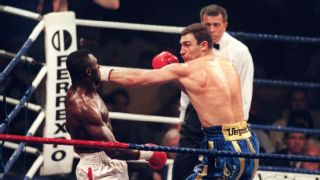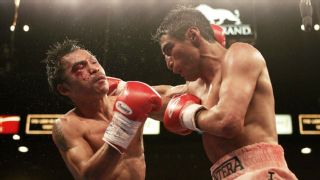The International Boxing Hall of Fame typically adds three new fighters to the 30-man ballot every year to replace the trio elected the previous year. However, there were so many quality candidates eligible to be added for the first time this year that the Hall of Fame expanded it to 32 to accommodate them.
Former three-time heavyweight titleholder Vitali Klitschko, former four-division titlist Erik Morales, former two-division titlist Ricky Hatton, former undisputed junior middleweight champion Ronald "Winky" Wright and former strawweight and junior flyweight titleholder Ivan "Iron Boy" Calderon all appear on the ballot in the modern category -- fighters whose last bout was no earlier than 1989 -- for the first time this year. To be eligible, fighters must not have boxed for at least five years.
Full members of the Boxing Writers Association of America and a panel of international boxing historians began receiving their ballots this week. They are due back by Oct. 31 with results of the voting due to be announced in December.
Voters can select up to five fighters but only three will be elected, and the 29th annual induction ceremonies are scheduled to take place on June 10 at the Canastota, New York, shrine.
With all five newcomers having strong cases for enshrinement, it means at least two will be left out, making this one of the most difficult elections in years.
Ed Brophy, the executive director of the Hall of Fame, said that when the depth of the list of potential candidates became clear, the HOF decided to slightly expand the usual ballot.
"It's up to the discretion of the Hall of Fame and there were five new names that were chosen to be put on the modern ballot this year," Brophy told ESPN. "There have been three new names usually for many years. This year we used our discretion and decided to add five. We have that flexibility."
Vitali Klitschko currently is the mayor of Kiev, Ukraine, but during his boxing career he was one of the best heavyweights in the world. At one point, he and younger brother Wladimir Klitschko held all of the major heavyweight titles simultaneously.
Klitschko (45-2, 41 KOs), 46, of Ukraine, boxed from 1996 to 2012, though he was retired from 2005 to 2008.
He lost his first title by ninth-round knockout to the much smaller Chris Byrd in 2000. Klitschko dominated the fight but took enormous criticism for retiring on his stool after the ninth round because of what turned out to be a badly torn rotator cuff. He shook off the quitter label in 2003 in his most memorable fight and his only other loss.
He challenged then-champion Lennox Lewis in what turned out to be Lewis' final fight in 2003 in a hastily made bout at the Staples Center in Los Angeles. They were set to appear in a doubleheader as a way to build toward their eventual showdown, but when Lewis opponent Kirk Johnson pulled out of the fight with an injury, HBO was able to work out a deal for Lewis and Klitschko to face each other on less than two weeks' notice.
It was a classic heavyweight brawl. Lewis was trailing on the scorecards after the sixth round, but he had torn open a horrible cut around Klitschko's left eye, forcing the fight to be stopped.
Two fights later, Klitschko knocked out Corrie Sanders in the eighth round in 2004 to win the belt Lewis had vacated upon his retirement. Klitschko made one defense against Danny Williams at the end of 2004 but then retired because of debilitating back and knee injuries.
Klitschko came out of retirement in 2008 and smashed then-titlist Samuel Peter in eight one-sided rounds to reclaim his belt. He made nine defenses, all one-sided victories, including against Chris Arreola, Shannon Briggs, Tomasz Adamek and Dereck Chisora. After stopping Manuel Charr in September 2012, Klitschko retired to pursue his political career in Ukraine, where he has been a champion for government reform.

Morales (52-9, 36 KOs), 41, who grew up in an apartment over a boxing gym in Tijuana and was taught to box by his late father, Jose, fought from 1993 to 2012 and became one of the greatest fighters in Mexican history. He made his name with a series of exciting slugfests and became the first fighter from his country to win world titles in four weight classes, capturing belts at junior featherweight, featherweight, junior lightweight and junior welterweight.
Morales, however, will always be tied to 2017 HOF inductee Marco Antonio Barrera, his countryman with whom he engaged in one of the fiercest trilogies in history. Morales prevailed in their first epic battle, a junior featherweight unification fight in 2000 that is one of the greatest fights in history. Barrera went on to win the rematch (a featherweight title fight) and the rubber match (a junior lightweight fight nearly as good as the first).
But perhaps even bigger than Morales' victory over Barrera was his 2005 unanimous decision against a prime Manny Pacquiao in the first fight of their trilogy. Pacquiao followed the loss with his historic 15-fight run up the scale that included knockout victories against Morales in their second and third fights.
Hatton (45-3, 32 KO), 39, who boxed from 1997 to 2012, may have been the most popular fighter ever from the United Kingdom. He won world titles at junior welterweight and welterweight and captured the imagination of the British public as a kid from a working-class family in Manchester who went on to international stardom but remained an everyman.
"When you first lace the gloves on as a 10-year-old, being in the Hall of Fame isn't even on your radar. It's an impossible dream," Hatton told ESPN. "Didn't think I could be a world champion, but I did. But to be nominated to possibly go in the Hall of Fame alongside the greatest names in the sport would have to be my proudest achievement."
His signature victory came before a packed house at Manchester Arena in 2005 when he dethroned junior welterweight world champion Kostya Tszyu, a Hall of Famer, by 11th-round knockout in an upset. Hatton unified two belts in his next fight by knocking out Carlos Maussa in the ninth round and then moved up to welterweight, where he controversially outpointed Luis Collazo to win another title. Then he returned to junior welterweight and won another belt against Juan Urango and scored a big win against former lightweight champion Jose Luis Castillo with a body shot.
In 2007, he returned to welterweight to challenge champion Floyd Mayweather, but even though Hatton was stopped in the 10th round, the scene that week in Las Vegas was unprecedented as some 30,000 British fans filled the city to party for the week. In 2009, Hatton had another huge fight, this time with Pacquiao, and suffered a brutal second-round-knockout loss that sent him into retirement. He returned for one more fight in 2012 against former welterweight titlist Vyacheslav Senchenko, and got stopped in the ninth round.
Wright (51-6-1, 25 KOs), 45, a southpaw from St. Petersburg, Florida, boxed from 1990 to 2012 and was one of the slickest defensive fighters in history.
"I'm very pleased and grateful that I'm nominated for the boxing Hall of Fame," Wright told ESPN. "And I'm glad that the boxing community appreciates my hard work and all my accomplishments."

Unable to get fights with quality opponents, he globe-trotted for much of his career, fighting in places such as France, Germany, England and South Africa. But he won a junior middleweight belt in 1996 and defended it three times. In 1999, he got a mandatory shot at then-titleholder Fernando Vargas and lost by controversial majority decision. He eventually won another world title in 2001, and in 2004, Shane Mosley, who held two belts, finally gave him the big fight he had craved.
Wright outpointed Mosley to become the undisputed champion. He beat Mosley again in an immediate rematch and then put on a masterpiece in a near shutout of Hall of Famer Felix Trinidad in 2005.
In 2006, Wright came within a whisker of winning the unified middleweight world title but was held to a disputed draw with Jermain Taylor. Wright outpointed former welterweight titlist Ike Quartey in his next fight but then lost his final three bouts, including to Bernard Hopkins.
Calderon (35-3-1, 6 KOs), 42, was a defensive wizard with very little power but that did not stop him from having a dominant run as strawweight champion. A southpaw who was on the 2000 Puerto Rican Olympic team, Calderon is widely considered the greatest strawweight in division history other than Hall of Famer Ricardo Lopez.
Calderon won a strawweight title -- boxing's smallest division at 105 pounds -- in 2003 and made 11 defenses, all in dominant fashion. In 2007, he moved up to junior flyweight and outpointed Hugo Cazares to win a world title and made six defenses before getting stopped by Giovani Segura in consecutive fights.
The holdovers on the 32-man modern ballot are Yuri Arbachakov, Paulie Ayala, Nigel Benn, Sot Chitalada, Donald Curry, Chris Eubank Sr., Leo Gamez, Genaro Hernandez, Julian Jackson, Santos Laciar, Rocky Lockridge, Miguel "Happy" Lora, James "Buddy" McGirt, Henry Maske, Darius Michalczewski, Sung-Kil Moon, Michael Moorer, Orzubek "Gussie" Nazarov, Sven Ottke, Vinny Pazienza, Gilberto Roman, Gianfranco Rosi, Samuel Serrano, Meldrick Taylor, Fernando Vargas, Wilfredo Vazquez Sr. and Ratanapol Sor Vorapin.
Candidates will also be elected in the observer, non-participant and old-timer categories. The most notable newcomer to the 30-person observer category is longtime Showtime broadcaster Jim Gray.
